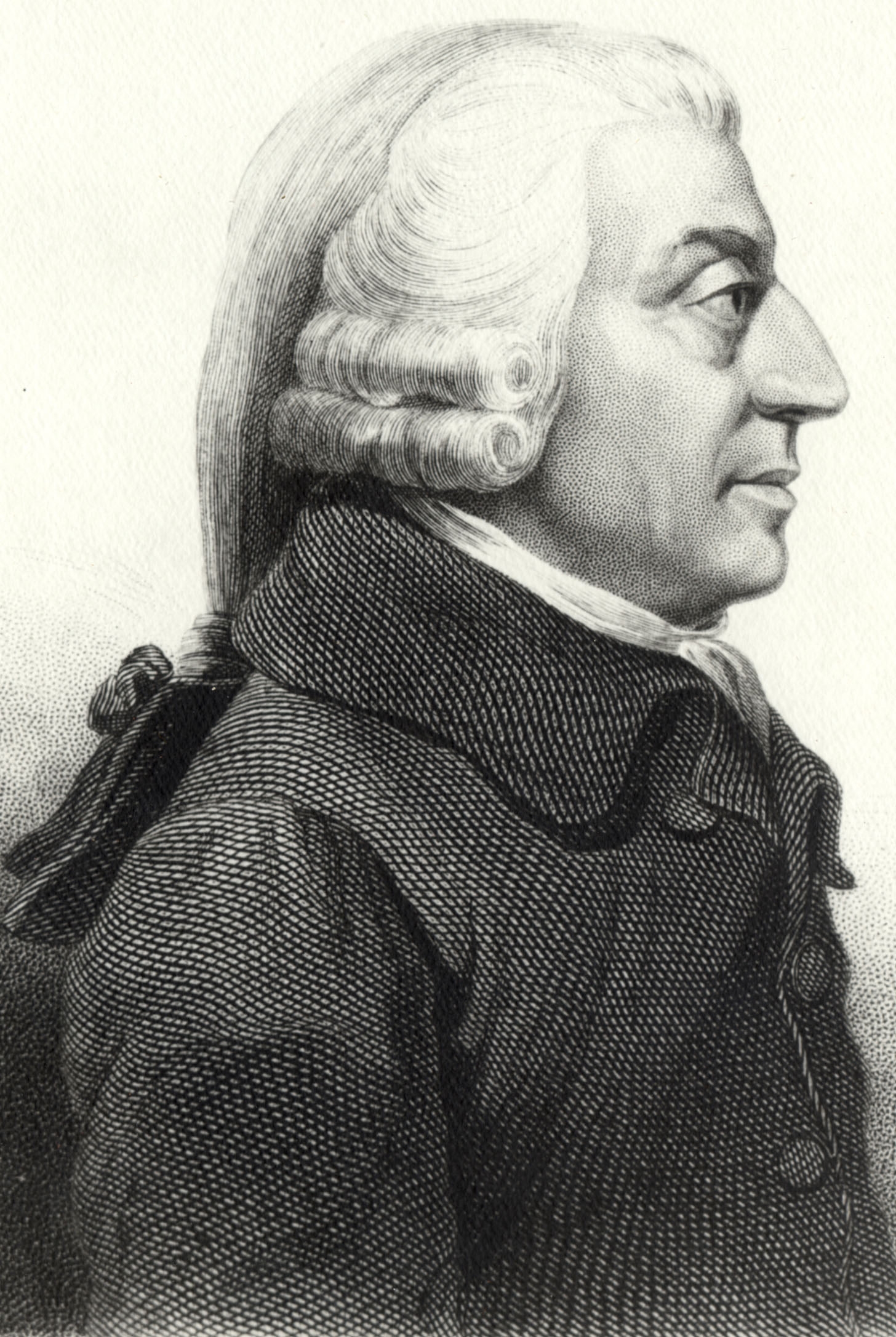Fuente: Smith, Adam. La riqueza de las naciones. Edición de Carlos Rodríguez Braun. Editor digital: Titivillus. Página 321
Fuente: La riqueza de las naciones, Libro IV.
Frases célebres de Adam Smith
Fuente: Citado en Amate Pou, Jordi.Paseando por una parte de la Historia: Antología de citas. Editorial Caligrama, 2017. ISBN 9788417321871. p. 43.
Fuente: La riqueza de las naciones
Fuente: Smith, Adam.La riqueza de las naciones, Libro I, Capítulo 8: De los salarios del trabajo, página 94.
Fuente: La riqueza de las naciones.
“En realidad, la atracción o el afecto no son más que simpatía de la costumbre.”
Fuente: Citado en Amate Pou, Jordi.Paseando por una parte de la Historia: Antología de citas. Editorial Caligrama, 2017. ISBN 9788417321871. p. 42.
Adam Smith Frases y Citas
An Inquiry into the Nature and Causes of the Wealth of Nations. Volume I
Adam Smith: Frases en inglés
“Fear is in almost all cases a wretched instrument of government”
Fuente: The Wealth of Nations (1776), Book V, Chapter I, Part III, p. 862.
Contexto: Fear is in almost all cases a wretched instrument of government, and ought in particular never to be employed against any order of men who have the smallest pretensions to independency.
Fuente: The Wealth of Nations (1776), Book IV, Chapter I, p. 481.
Contexto: The commodities of Europe were almost all new to America, and many of those of America were new to Europe. A new set of exchanges, therefore, began.. and which should naturally have proved as advantageous to the new, as it certainly did to the old continent. The savage injustice of the Europeans rendered an event, which ought to have been beneficial to all, ruinous and destructive to several of those unfortunate countries.
Fuente: The Wealth of Nations (1776), Book III, Chapter IV, p. 448.
Fuente: (1776), Book V, Chapter I, Part II, 775.
“Never complain of that of which it is at all times in your power to rid yourself.”
Fuente: The Theory Of Moral Sentiments
Fuente: (1776), Book I, Chapter VIII, p. 94.
“Mercy to the guilty is cruelty to the innocent.”
Section II, Chap. III.
The Theory of Moral Sentiments (1759), Part II
Fuente: The Wealth of Nations (1776), Book V, Chapter II, Part II, Article I, p. 911.
Contexto: The necessaries of life occasion the great expense of the poor. They find it difficult to get food, and the greater part of their little revenue is spent in getting it. The luxuries and vanities of life occasion the principal expense of the rich, and a magnificent house embellishes and sets off to the best advantage all the other luxuries and vanities which they possess. A tax upon house-rents, therefore, would in general fall heaviest upon the rich; and in this sort of inequality there would not, perhaps, be anything very unreasonable. It is not very unreasonable that the rich should contribute to the public expense, not only in proportion to their revenue, but something more than in that proportion.
Fuente: The Wealth of Nations (1776), Book I, Chapter X, Part II, p. 152.
Contexto: People of the same trade seldom meet together, even for merriment and diversion, but the conversation ends in a conspiracy against the public, or in some contrivance to raise prices. It is impossible indeed to prevent such meetings, by any law which either could be executed, or would be consistent with liberty or justice. But though the law cannot hinder people of the same trade from sometimes assembling together, it ought to do nothing to facilitate such assemblies; much less to render them necessary.
“Wherever there is great property, there is great inequality.”
Fuente: (1776), Book V, Chapter I, Part II, p. 770.
Fuente: The Wealth of Nations
Section I, Chap. I.
The Theory of Moral Sentiments (1759), Part I
Fuente: (1776), Book I, Chapter II, p. 14.
Fuente: The Wealth of Nations
“It is not from the benevolence of the butcher, the brewer, or the baker”
Fuente: The Wealth of Nations (1776), Book I, Chapter II, p. 19.
Fuente: The Wealth of Nations, Books 1-3
Contexto: But man has almost constant occasion for the help of his brethren, and it is in vain for him to expect it from their benevolence only. He will be more likely to prevail if he can interest their self-love in his favour, and shew them that it is for their own advantage to do for him what he requires of them. Whoever offers to another a bargain of any kind, proposes to do this. Give me that which I want, and you shall have this which you want, is the meaning of every such offer; and it is in this manner that we obtain from one another the far greater part of those good offices which we stand in need of. It is not from the benevolence of the butcher, the brewer, or the baker that we expect our dinner, but from their regard to their own interest. We address ourselves, not to their humanity, but to their self-love, and never talk to them of our own necessities, but of their advantages. Nobody but a beggar chooses to depend chiefly upon the benevolence of his fellow-citizens.
Fuente: (1776), Book IV, Chapter I, p. 469.
Fuente: (1776), Book IV, Chapter II
Fuente: (1776), Book IV, Chapter VII, Part First, p. 610.
Fuente: (1776), Book I, Chapter X, Part II, p. 155.
Section I, Chap. III.
The Theory of Moral Sentiments (1759), Part I
Fuente: (1776), Book IV, Chapter II
“It seldom happens, however, that a great proprietor is a great improver.”
Fuente: (1776), Book III, Chapter IV, p. 420.
Fuente: (1776), Book V, Chapter II, Part II, Article IV, p. 954-955.
Fuente: (1776), Book V, Chapter I, Part III, Article I, p. 810.
Fuente: (1776), Book V, Chapter II, Part II, Appendix to Articles I and II.
“The world neither ever saw, nor ever will see, a perfectly fair lottery.”
Chapter X, Part I http://books.google.com/books?id=QItKAAAAYAAJ&q=%22The+world+neither+ever+saw+nor+ever+will+see+a+perfectly+fair+lottery%22&pg=PA76#v=onepage.
(1776), Book I
